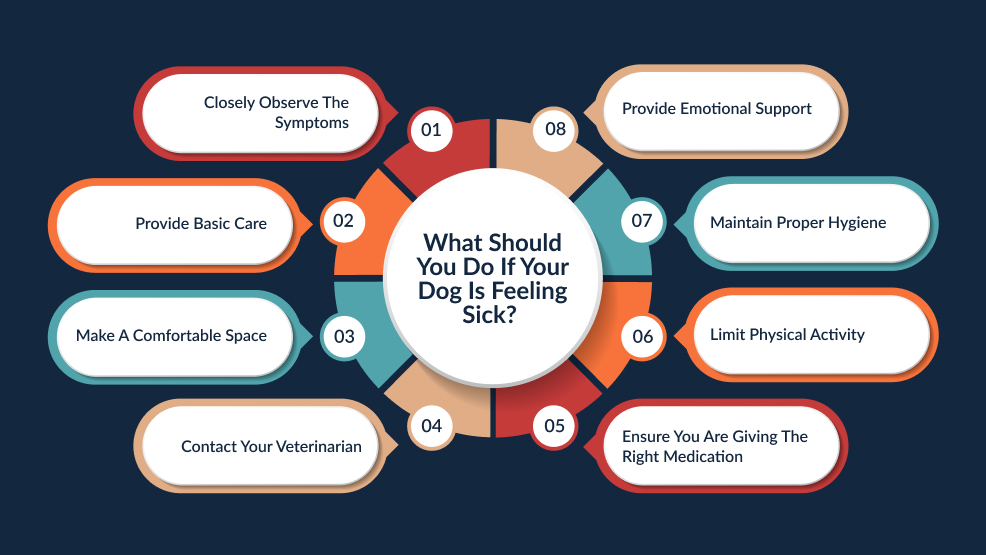Is It Time To Visit The Vet? Here Are The Telltale Signs Your Dog Is Sick


We all know that our furry friends can’t exactly tell us when they’re feeling under the weather. But as pet parents, it’s our job to watch for those subtle (and sometimes not-so-subtle) signs that something might be off.
Whether it’s a change in appetite, a sudden bout of lethargy, or just a gut feeling that your pup isn’t quite themselves, recognizing the signs of illness early can make all the difference. So, snuggle up with your pooch, and let’s dive into the telltale signs your dog might be sick.
What Are Signs That Your Dog is Sick?

Dogs are masters at masking their ailments, but certain red flags can alert you to potential health issues. By familiarizing yourself with these common signs of illness, you’ll be able to quickly identify when your pup feels under the weather.
Changes in Appetite
One of the most noticeable indicators of a health problem in dogs is a change in their eating habits or weight. A sudden loss of appetite or a refusal to eat could signify an underlying condition, such as dental issues, gastrointestinal problems, or even an infection. On the other hand, an increased appetite coupled with weight loss might be a sign of a metabolic disorder or a parasitic infestation.
It’s essential to monitor your dog’s food and water intake, as well as their weight, and report any significant changes to your veterinarian. A dog’s reluctance to eat or drink can quickly lead to dehydration and malnutrition, exacerbating their condition.
Changes in Drinking Habits
Along with appetite, if you notice any change in your dog’s drinking habit, you should be concerned. This is because drinking more water than usual can indicate conditions like diabetes or kidney disease. On the other hand, drinking less water can indicate nausea or dental issues.
Lethargy and Decreased Activity
Energetic and playful by nature, a sudden decrease in your dog’s activity level or a general lack of enthusiasm can cause concern. If your once-lively pup seems lethargic, reluctant to play, or spends more time sleeping than usual, it could indicate that your dog is feeling sick.
Lethargy can be a symptom of various conditions, including infections, pain, or even organ dysfunction. Pay close attention to your dog’s energy levels and report any significant changes to your veterinarian, as lethargy can sometimes be a sign of a more serious problem.
Persistent Coughing Or Sneezing
While an occasional cough or sneeze is normal, persistent or recurring episodes could indicate a respiratory issue. Coughing or sneezing can be caused by various factors, such as allergies, infections, or even heart disease.
If your dog is coughing or sneezing more frequently than usual, or if the episodes seem prolonged or severe, it’s essential to have them examined by a veterinarian. Respiratory issues can be uncomfortable for your pet and, if left untreated, can potentially lead to more severe complications.
Vomiting or Diarrhea
Occasional vomiting or diarrhea can be a normal occurrence, especially if your dog has consumed something they shouldn’t have. However, if these symptoms persist or become severe, they could be signs of an underlying health issue.
Vomiting and diarrhea in dogs can be caused by a variety of factors, including:
- Gastrointestinal infections
- Food allergies or intolerances
- Parasites
- Pancreatitis
If your dog is experiencing persistent vomiting or diarrhea, it’s crucial to seek veterinary attention promptly, as these symptoms can quickly lead to dehydration and electrolyte imbalances, which can be life-threatening if left untreated. You should also go through vomiting and dog diarrhea complete guide to have a better understanding of these two conditions.
Changes in Behavior or Mood
Dogs are known for their unwavering loyalty and affectionate nature, so any sudden changes in their behavior or mood can cause concern. If your once-friendly pup becomes aggressive or withdrawn, or if they seem anxious or disoriented, it could be a sign of an underlying health issue.
Behavioral changes can be caused by a variety of factors, including:
- Pain or discomfort
- Neurological disorders
- Cognitive dysfunction
- Hormonal imbalances
If you notice any significant changes in your dog’s behavior or mood, it’s essential to consult with your veterinarian to rule out any potential health issues.
Skin Problems and Excessive Scratching
A healthy coat is a sign of a healthy dog, so any changes in your pet’s skin or fur can indicate an underlying issue. Excessive scratching, hot spots, hair loss, or dry, flaky skin can all be signs of skin conditions, allergies, or even parasitic infestations.
While some skin issues can be minor and easily treatable, others can be more serious and require prompt veterinary attention. If you notice any unusual changes in your dog’s skin or coat, or if they seem to be scratching excessively, it’s best to have them examined by a professional.
Abnormal Urination or Issues With Bowel Movement
Changes in your dog’s urination habits or water intake can be signs of various health issues, including urinary tract infections, kidney disease, or even diabetes. If you notice your dog drinking more water than usual or if they seem to be urinating more frequently or in inappropriate places, it’s important to have them evaluated by a veterinarian.
Abnormal urination or changes in drinking habits can also be indicative of other underlying conditions, such as hormonal imbalances or neurological disorders. By monitoring these behaviors and reporting any significant changes to your vet, you can help ensure your pet receives the appropriate treatment and care.
Eye and Ear Issues
Your dog’s eyes and ears are delicate and sensitive areas, and any problems in these regions can be signs of an underlying health issue. If you notice any discharge, redness, or swelling in your pet’s eyes or ears, or if they seem to be scratching or rubbing at these areas excessively, it’s important to have them examined by a veterinarian.
Eye and ear issues can be caused by various factors, including infections, allergies, or even foreign objects. Left untreated, these conditions can lead to more serious complications, such as vision or hearing impairment, so it’s crucial to address any concerns promptly.
Dental Problems
Dental health is often overlooked when it comes to our furry friends, but poor oral hygiene can lead to various health issues. If you notice any signs of dental problems, such as bad breath, excessive drooling, difficulty eating, or pale gums in dogs it’s important to have your dog’s teeth examined by a professional.
Some of the common dental issues that dogs suffer from are:
- Periodontal disease
- Tooth decay
- Broken or damaged teeth
- Oral infections
Regular dental check-ups and cleanings can help prevent these issues and ensure your dog’s overall health and well-being.
Changes in Your Dog’s Weight
A sudden change in your dog’s weight can be a significant indicator of underlying health issues. For instance, health problems like inflammatory bowel disease, food allergies, or infections can affect your dog’s ability to absorb nutrients, leading to weight loss.
Similarly, unexplained weight gain can also be a sign of conditions like hypothyroidism and heart disease. It can also be due to overfeeding and lack of exercise, hence you should familiarize yourself with the do’s and don’ts for feeding your dogs.
Sudden and Excessive Vocalization
If you notice that your normally quiet dog is vocalizing a lot these days, these are signs your dog is sick or in pain. Conditions like pain, injury, and gastrointestinal issues can cause increased vocalization. Moreover, some older dogs may develop CDS, similar to dementia in humans, which can lead to increased vocalization1.
Difficulty in Movement
If your dog is facing difficulty in moving around, it is a significant indicator that your dog might be experiencing some health issues. Some of the common causes are arthritis, hip dysplasia, injuries and muscle weakness.
Consult your vet as soon as possible if you see your dog is facing difficulty in movement. Also, ensure your dog has a comfortable place to rest and avoid strenuous activities until you have a diagnosis.
Excessive Panting
Excessive panting in dogs can be quite concerning and usually indicates an underlying health issue. It can range from something harmless like anxiety or stress to heatstroke and heart disease.
Loss of Hair
It is normal to see some amount of your dog’s hair when you run your hand through their coat. However, if you see that more than the usual amount of hair is coming and there are some bald patches, you should be concerned.
This is because sudden hair loss in dogs usually indicates conditions like allergies, infections, parasites, and hormonal imbalances. If you notice other symptoms like change in appetite, behavior, or energy level, consult a vet as soon as possible.
Lack of Coordination
A lack of coordination in dogs, also known as ataxia, can be a significant indicator that your dog might be experiencing serious health issues. It can be anything from metabolic disorders and toxins to inner ear problems and neurological disorders.
What Should You Do if Your Dog is Feeling sick?

If you see any of the above signs indicating the fact that your dog is not feeling very well, then you need to act promptly to get them the care they need. So, what should you do if your dog is feeling sick? We have explained in a step-by-step manner below:
Step 1: Closely Observe the Symptoms
If you suspect that your dog is feeling under the weather, then pay close attention to your dog’s behavior and physical condition. Assess if the symptoms are mild or severe. Mild symptoms include slight lethargy, vomiting, diarrhea, and lack of appetite just for a day. On the other hand, severe symptoms in dogs include excessive licking or scratching, persistent vomiting and diarrhea, and difficulty in breathing.
Step 2: Provide Basic Care
If your dog is showing mild symptoms like one or two episodes of diarrhea or vomiting or they are not showing a lot of interest in food, then provide basic care like providing a bland diet of chicken and rice. You should also make sure that they have access to fresh water. If your dog is reluctant to drink, try ice cubes or a small amount of low-sodium chicken broth. You can also add probiotics for dogs to their meals in case of digestive issues.
Step 3: Make A Comfortable space
If your dog is acting lethargic, provide a calm, quiet area for your dog to rest. This helps reduce stress and allows them to sleep undisturbed. This allows their body to heal on their own. In addition to quiet space, ensure they have a comfortable bed or blanket to lie on. This is especially important if they are experiencing joint pain or discomfort.
Step 4: Contact Your Veterinarian
However, if your dog does not get better in 2-3 days and the symptoms worsen, you should contact your vet. Describe the symptoms in detail and follow their advice. For severe symptoms, seek immediate veterinary care.
Here are some general guidelines for when to consult a veterinarian immediately:
- When your dog is exhibiting any of the signs of illness mentioned above, and the symptoms persist for more than two days.
- If your dog seems to be in a lot of pain or discomfort.
- In case your dog is bleeding
- If your dog is foaming at the mouth
- When your dog is having seizures or has fainted
Remember, your veterinarian is your partner in your dog’s health and well-being, so don’t hesitate to reach out with any concerns or questions.
Step 5: Ensure you are giving the right medication
Administer any prescribed medications exactly as directed by your vet. Use treats or a pill pocket to make it easier if your dog resists. Some medicines may not suit your pup, so keep an eye out for any adverse reactions to medications and report them to your vet immediately.
Step 6: Limit Physical Activity
Allow your dog to rest and avoid strenuous activities. If your dog needs some activity, keep it low-impact and brief. Short, gentle walks may be okay but consult your vet first.
Step 7: Maintain Proper Hygiene
Keep your dog’s resting area clean and free from dirt and bacteria. Also, ensure your dog’s coat is clean to help prevent any skin issues or parasites.
Step 8: Provide Emotional Support
Lastly, don’t forget to spend time with your dog, offering gentle petting and comfort. With you by their side, your sick dog will feel more relaxed and comfortable. This will help in reducing their anxiety and help them to get better soon.
Preventive Measures to Stop Your Dog From Falling Sick Often
While it’s impossible to completely prevent illness in dogs, there are several preventive measures you can take to help keep your furry friend healthy and happy:
- Regular veterinary check-ups: Routine wellness exams and preventive care, such as vaccinations and parasite control, can help catch and prevent many health issues before they become serious.
- Proper nutrition: Feeding your dog a balanced, high-quality diet appropriate for their age, size, and activity level can help maintain their overall health and well-being.
- Exercise and mental stimulation: Regular exercise and mental stimulation can help keep your dog physically and mentally fit, reducing the risk of obesity, boredom, and behavioral issues.
- Dental care: Regular dental cleanings and at-home brushing can help prevent dental diseases and other oral health issues.
- Grooming and hygiene: Proper grooming and hygiene, such as regular baths, nail trims, and ear cleaning, can help prevent skin and ear infections, as well as identify any potential issues early on.
- Environmental safety: Ensuring your home and outdoor spaces are free from potential hazards, such as toxic substances or sharp objects, can help prevent accidents and injuries.
By incorporating these preventive measures into your pet care routine, you can help keep your furry friend happy, healthy, and by your side for years to come.
⁕⁕ Remember, your dog can’t communicate its discomfort as easily as humans. So, it’s up to you to be its advocate and voice. Hence, you must familiarize yourself with common signs your dog is sick and provide the care it needs as soon as possible. Trust me, your pup will thank you for it and love you even more than they do now! ⁕⁕









Leave A Comment